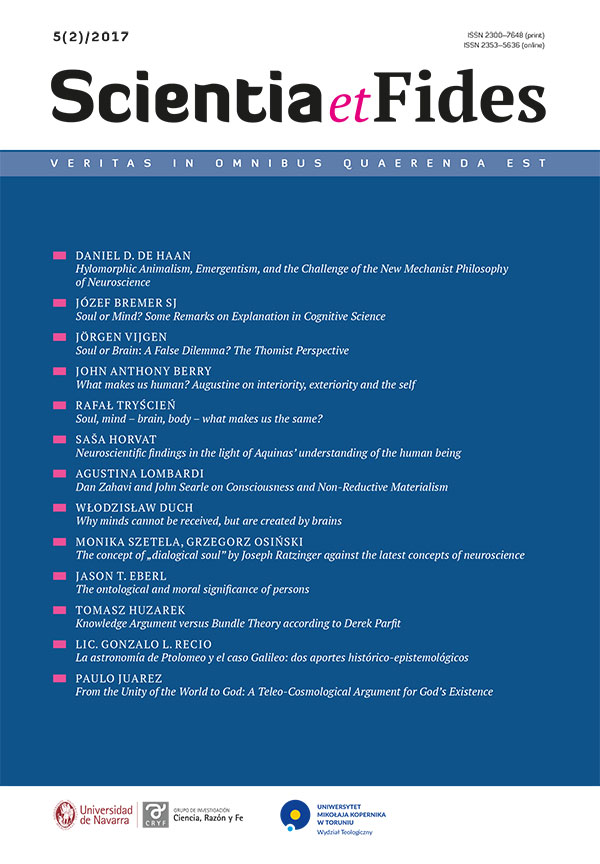The concept of “dialogical soul” by Joseph Ratzinger against the latest concepts of neuroscience
Keywords
dialogical soul, neuroscience, consciousness, anthropology, ontological relationsAbstract
The concept of the dialogical soul proposed by Joseph Ratzinger is a contemporary attempt to describe the anthropology of humanity in terms of basic, fundamental theological concepts. Epistemological approach of the dialogic soul is not about the division, but co-existence in the concept of humanity significantly different anthropological concepts. Modern neuroscience, although following completely different paths of knowing is currently concerning an important issue "of the embodied mind". Such a holistic effort to discover the truth about the man, though carried out on completely different epistemological platforms, however, have some points in common. The difficulty in finding a common language for the dialogue in this field can be overcome and lead to dialogue, which is extremely difficult but doable. We must, however, at the beginning formulate certain fundamental axioms that define class concepts used in different areas of scientific activity. The concept of dialogical soul of Ratzinger’s now exceeds the barrier of scientific paradigms axioms. It does not stop on the vision of human oneself, but recognition of one in the area of relationships and makes room for a substantial dialogue with the world of modern science.
References
A Dictionary of the Bible. 2016. „Tradent”. Accessed March 25 http://www.oxfordbiblicalstudies.com/.
Baggott, Jim. 2013. Farewell to Reality: How Modern Physics Has Betrayed the Search for Scientific Truth. London: Pegasus.
Brockam, John. 2008. W co wierzymy, choć nie potrafimy tego dowieść. Warszawa: Smak Słowa.
Duch,Włodzisław. 2010. „Czy jesteśmy automatami? Mózgi, wolna wola i odpowiedzialność.” In Na ścieżkach neuronauki, edited by Piotr Francuz. Lublin: KUL.
Kandel, Eric. 2008. „Interview with Eric R. Kandel: From Memory, Free Will, and the Problem with Freud to Fortunate Decisions.” Journal of Visualized Experiments 15:762.
Katechizm Kościoła Katolickiego. 2009. Poznań: Pallotinum.
Mazur Roman et al. 2011. Chaos w głowie. Mózg i życie. Inowrocław: Aspektpress.
Mazur Roman, Osiński Grzegorz. 2016. Neurologia kiliniczna. Homeostat mózgu. Inowrocław: AspektPress.
Osiński, Grzegorz. 2015. „Wizualizacja informacji. Badania struktur informacji w poszukiwaniu prawdy.” Fides Ratio et Patria 3.
Ratzinger, Joseph. 1988. Eschatology. Death and Eternal Life. Washington: The Catholic University of America Press.
Ratzinger, Joseph 1994. Wprowadzenie w chrześcijaństwo. Kraków: Znak.
Ravasi, Gianfranco. 2008. Krótka historia duszy. Kraków: Salwator.
Składanowski, Marcin. 2013. Ciało, dusza, duch. Myśl Josepha Ratzingera na tle współczesnej antropologii. Warszawa: Wydawnictwo Śióstr Loretanek.
Stewart, Ian. 2012. Dlaczego prawda jest piękna. Warszawa: Pruszyński.
Taleb, Nassim Nicholas. 2012. Antifragile. Things that gain from disorder. New York: Random House.
Wagner, Andreas. 2016. “Körper”. Accessed March 15. https://www.bibelwissenschaft.de/
Wolff, Hans Walter. 2002. Anthropologie des Alten Testaments. München: Gütersloher Verlagshaus.
Zybertowicz, Andrzej. 2015. Samobójstwo oświecenia. Kraków: Kacper .
Downloads
Published
How to Cite
Issue
Section
License
CC BY ND 4.0. The Creator/Contributor is the Licensor, who grants the Licensee a non-exclusive license to use the Work on the fields indicated in the License Agreement.
- The Licensor grants the Licensee a non-exclusive license to use the Work/related rights item specified in § 1 within the following fields: a) recording of Work/related rights item; b) reproduction (multiplication) of Work/related rights item in print and digital technology (e-book, audiobook); c) placing the copies of the multiplied Work/related rights item on the market; d) entering the Work/related rights item to computer memory; e) distribution of the work in electronic version in the open access form on the basis of Creative Commons license (CC BY-ND 3.0) via the digital platform of the Nicolaus Copernicus University Press and file repository of the Nicolaus Copernicus University.
- Usage of the recorded Work by the Licensee within the above fields is not restricted by time, numbers or territory.
- The Licensor grants the license for the Work/related rights item to the Licensee free of charge and for an unspecified period of time.
FULL TEXT License Agreement
Stats
Number of views and downloads: 1152
Number of citations: 3



